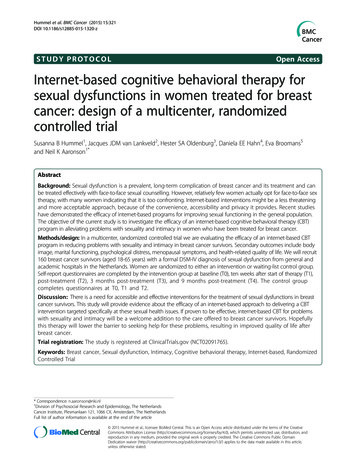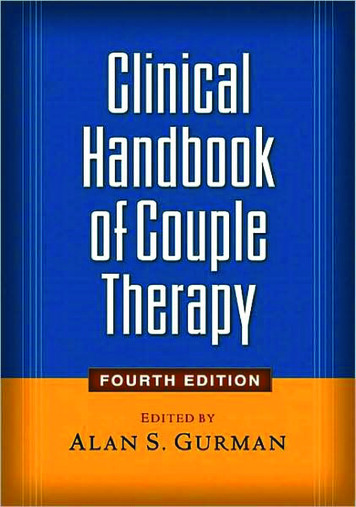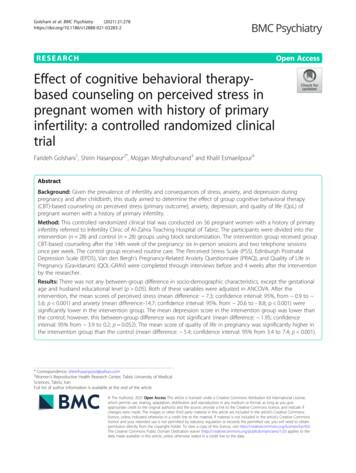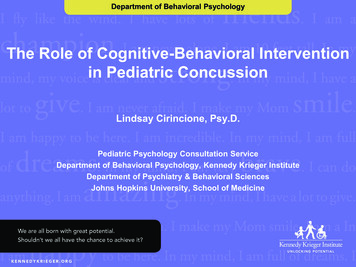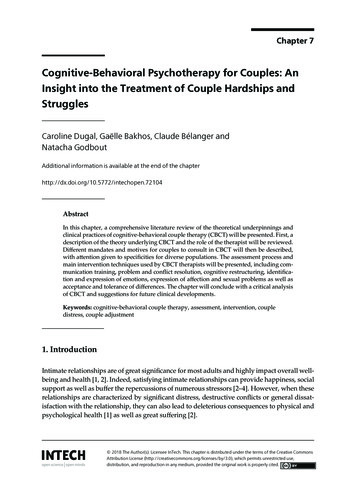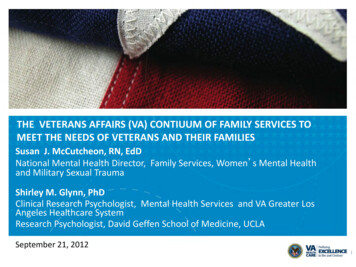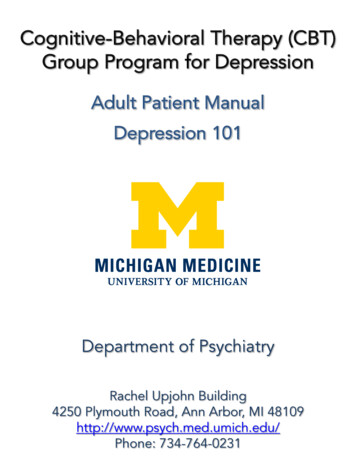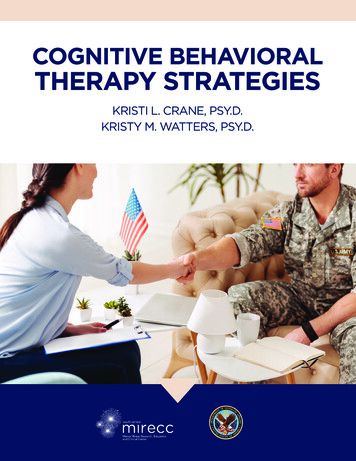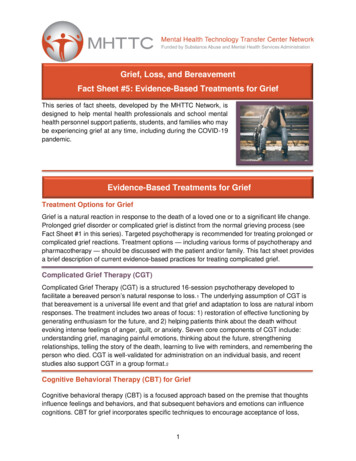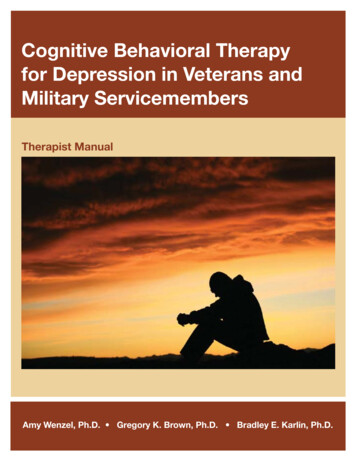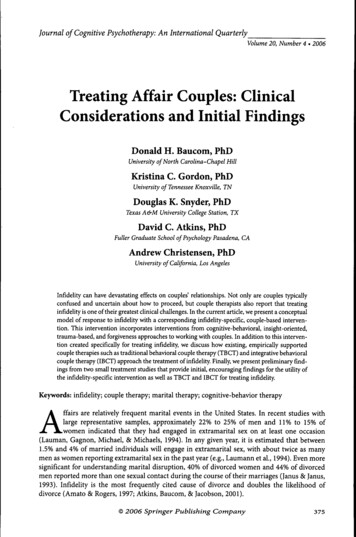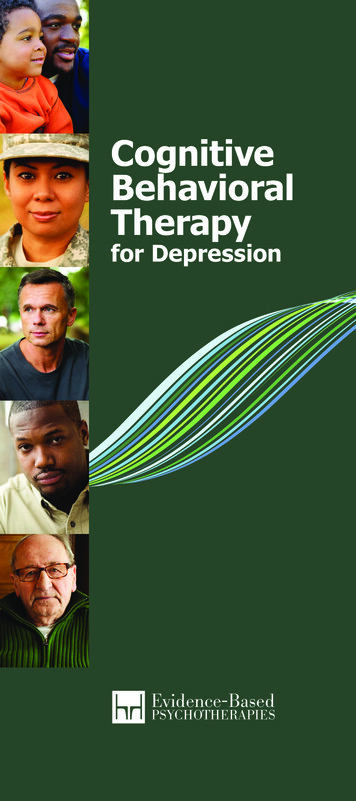
Transcription
CognitiveBehavioralTherapyfor DepressionEvidence-BasedPSYCHOTHERAPIES
What is the overall goal of CBT-D?The overall goal of CBT-D is to improve thesymptoms of depression by helping you todevelop more balanced and helpful thoughtsabout yourself, others, and the future and byhelping you spend more time engaging inpleasurable or productive activities. CBT-Dhelps Veterans to achieve personal goals andsolve problems by learning and practicingnew skills.
CBT-D is a highlyrecommendedtreatment for manyindividualswith depression.What is Cognitive BehavioralTherapy for Depression (CBT-D)?CBT-D is an effective treatment available toVeterans with depression in the Departmentof Veterans Affairs health care system. CBT-Dis a highly recommended treatment for manyindividuals with depression.CBT-D is a short-term psychotherapy—or talktherapy—for treating symptoms of depressionwhich may include: Feeling sad, depressed or hopeless Lack of interest or pleasure in activities Feeling worthless or having extreme guilt Being irritable or agitated Difficulty making decisions or concentrating Loss of energy or fatigue Increase or decrease in appetite or sleep
Does CBT for depression work?CBT-D is one of the most studied andeffective therapies developed for depression.CBT-D is based on decades of researchand has been shown to be very effective withVeterans, specifically. Research supportsthe effectiveness of CBT-D for adolescents,younger adults, and older adults. Over 75%of people treated for depression showimprovement following CBT-D. This treatmentis at least as effective as medications, thoughboth CBT and medications can be helpful inthe treatment of depression for some people.Many Veterans with a history of depressioncontinue to enjoy treatment benefits longafter completing CBT-D.What will I be doing in CBT-D?In CBT-D, you will work with your therapist toestablish specific treatment goals that willhelp you learn new ways of thinking aboutsituations and cope with problems that comeup in the future, even after therapy has ended.These new skills will relieve your depressionand help you move forward in your life.
CBT-D can help toimprove the quality ofyour life and overalllevel of functioning.How is CBT-D different from othertalk therapies?Compared to some other types of talktherapy, CBT-D is more structured aroundteaching you skills and addressing specificgoals for changes you would like to see inyour life. You will spend time learning andpracticing new ways to solve problems andnew strategies to improve your mood.How long does CBT-D last?After you and your therapist have discussedyour treatment goals, your therapist maybe able to estimate the amount of time thatwill be required to attain those goals. CBTfor depression typically requires 12 to 16sessions to lead to significant improvement.Sessions last about 50 to 60 minutes whendelivered individually and 90 minutes whendelivered in a group. You will meet with yourtherapist regularly until the treatment goalshave been reached.
If you decide to participate inCBT-D, you will be asked to: Attend sessions regularlyWork together with your therapist to settherapy goalsAddress the most important issues duringeach sessionPractice the new CBT skills in your lifeoutside of sessionProvide feedback to your therapist aboutyour progress and how the therapy ishelpful to youIt will be important for you to use theinformation that you learn during the therapysessions and apply it to your everyday life tohelp you feel better.
What can I do to get ready forCBT-D?One of the first tasks in therapy is to set somereasonable goals that will help you to feelbetter. It would be helpful to think about whatdifficulties you would like to see improve. Forexample, consider which areas of your life,such as your personal relationships, workrelated activities, social activities, or physicalhealth, that you would like to improve.Can I receive CBT-D and takemedication for depression?Yes. For some people, medications can be anappropriate treatment in addition to CBT-Dand may provide benefits to Veterans withdepression. However, many people aresuccessfully treated with CBT-D without takingmedication for their depression.How will I know if CBT-D hasbeen helpful?You will likely notice that your mood hasimproved by feeling less depressed, anxious,or irritable. You may also notice that you aregetting more enjoyment or fulfillment out ofyour activities, finding yourself achieving goalsyou set at the start of therapy, and movingforward in your life.
For more information aboutCBT for Depression, pleasetalk with your local VA provider.www.va.gov
What is Cognitive Behavioral Therapy for Depression (CBT-D)? CBT-D is an effective treatment available to Veterans with depression in the Department of Veterans Affairs health care system. CBT-D is a highly recommended treatment for many individuals wit
